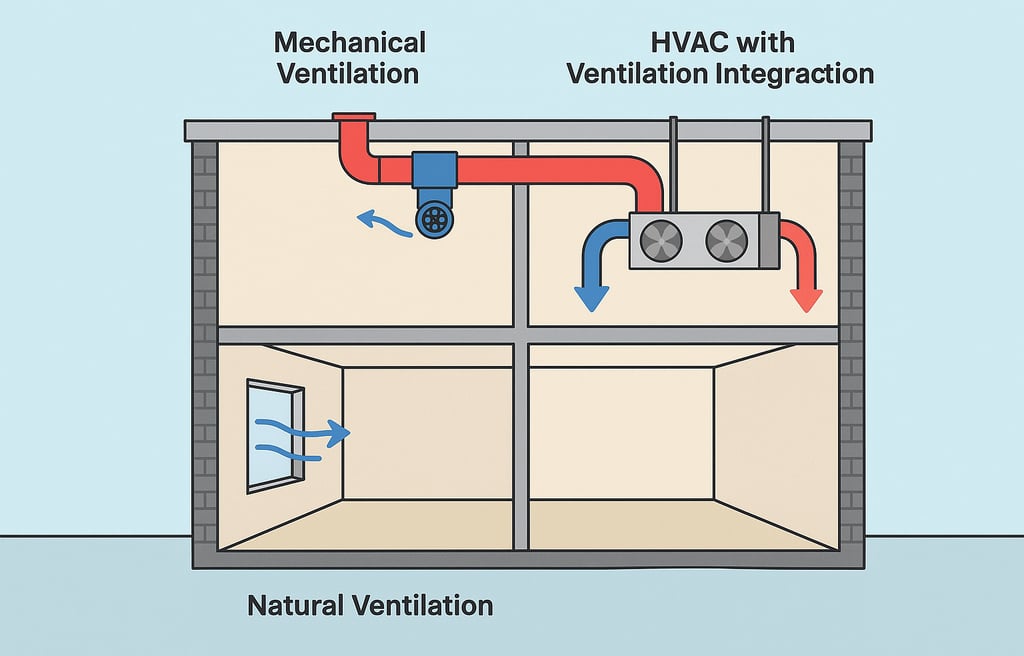How to Choose the Right Ventilation System for Your Building
How to Choose the Right Ventilation System for Your Building. Where should you begin? In this guide, we’ll break down the key considerations and types of ventilation systems to help you select the most suitable solution for your building.
7/26/20252 min read


How to Choose the Right Ventilation System for Your Building
Proper ventilation is more than just fresh air—it’s the foundation of a healthy, efficient, and compliant building. Whether you manage an office tower, a hospital, or a basement parking facility, choosing the right ventilation system ensures air quality, energy savings, and occupant comfort. But with so many options available, where should you begin?
In this guide, we’ll break down the key considerations and types of ventilation systems to help you select the most suitable solution for your building.
Why Ventilation Matters
Ventilation systems are responsible for:
Removing stale indoor air, pollutants, and moisture
Introducing fresh, filtered air from outside
Controlling temperature and humidity
Reducing the risk of mold, bacteria, and airborne diseases
Improving comfort and compliance with health and safety standards
Without proper ventilation, your building could suffer from poor air quality, structural damage, and increased energy costs.
1. Understand Your Building Type and Usage
Start by identifying your building’s primary function and areas of concern.
Ask the following:
Is it a commercial, residential, or industrial building?
Are there enclosed or windowless areas (e.g., basement parking, server rooms)?
How many occupants are typically inside?
Are there indoor air pollutants or processes that require extraction?
For example:
Basement ventilation systems must prioritize exhaust fans and CO monitoring.
Offices and retail spaces may benefit from energy-recovery ventilation systems.
Healthcare facilities require HEPA filtration and negative pressure rooms.
2. Know the Types of Ventilation Systems
✅ Natural Ventilation
Relies on openings like windows and vents
Energy-efficient but not always reliable in enclosed spaces
Works best in low-rise buildings and structures with good airflow design
✅ Mechanical Ventilation
Uses fans and ducts to control airflow
Includes exhaust-only, supply-only, or balanced systems
Recommended for basements, malls, condominiums, and hospitals
✅ HVAC with Ventilation Integration
Combines heating, ventilation, and air conditioning
Offers full control of air quality, humidity, and temperature
Ideal for modern buildings requiring consistent air treatment
✅ Energy Recovery Ventilators (ERV) / Heat Recovery Ventilators (HRV)
Recycles indoor air energy while bringing in fresh air
Reduces cooling/heating load
Best for energy-efficient buildings
3. Evaluate System Capacity and Airflow Rate
Ventilation needs are measured in air changes per hour (ACH) or cubic feet per minute (CFM). Work with a licensed ventilation contractor to calculate the correct airflow based on:
Floor area
Ceiling height
Occupancy level
Indoor air pollutants (e.g., CO₂, VOCs)
An undersized system won’t remove contaminants effectively. An oversized system may increase energy costs.
4. Consider Maintenance and Operation Costs
A good ventilation system should be:
Easy to clean and maintain
Equipped with accessible filters and fans
Durable for long-term use
Energy-efficient to reduce monthly utility costs
Some systems include automated sensors and smart controls for optimized performance—ideal for building management systems (BMS).
5. Think About Compliance and Safety
Make sure your system complies with local building codes and safety regulations in the Philippines, such as:
National Building Code (NBCP)
Fire Code of the Philippines
Department of Health ventilation guidelines (especially for healthcare)
For basement parking areas, carbon monoxide (CO) sensors and jet fans are often required to ensure proper air quality.
Final Tips
Work with a professional HVAC contractor or mechanical engineer
Ask for airflow simulations and design plans
Prioritize long-term energy efficiency over initial cost
Don’t neglect specialty areas like kitchens, toilets, or storage rooms
Need help choosing the right system?
At VentilationPH, we design and install customized ventilation systems for commercial, residential, and industrial buildings. From basement exhausts to complete HVAC integrations, our team ensures that your air stays clean, safe, and compliant.
👉 Contact us today for a free assessment or consultation.
Expertise
Providing reliable ventilation solutions for your needs.
CONTACT US:
Testimonials
E-mail: sales@ventilationph.com
(02) 7002 - 1172
(0961) 539-3840
(0977) 142-0492
© 2024. All rights reserved.
QC: Megastate Building, 737 G. Araneta Ave, Quezon City
Makati: 156 H.V. Dela Costa Street, Makati City
Davao: J.P. Laurel Ave, Bajada, Davao City
*** Photocredits: JG; FSantos, Unsplash
